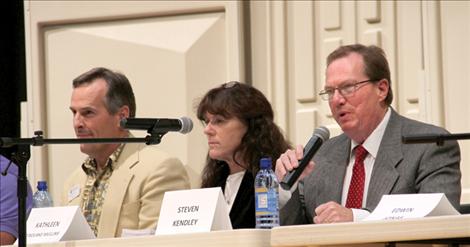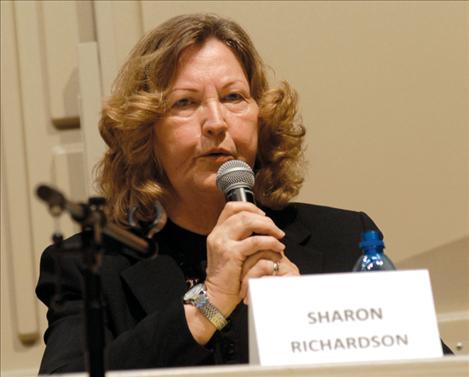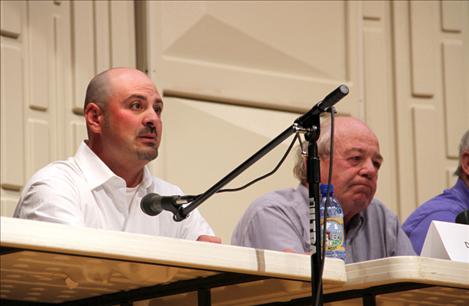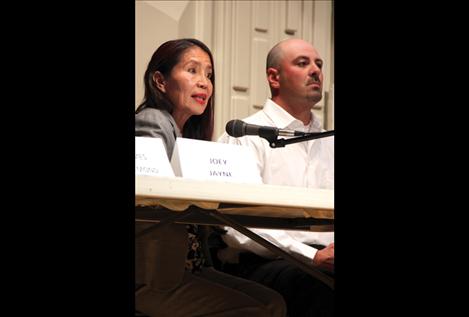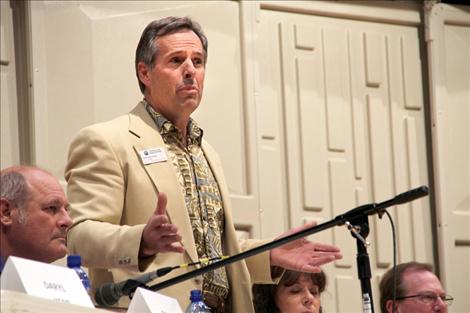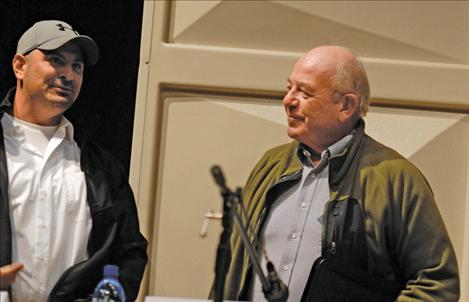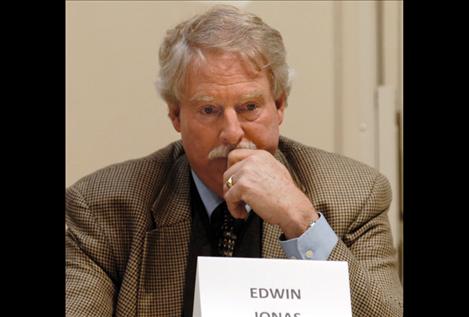JP candidates speak out on issues
Hey savvy news reader! Thanks for choosing local.
You are now reading
3 of 3 free articles.
POLSON — Nine of the candidates for Lake County Justice of the Peace packed the Polson High School stage for a candidate forum co-sponsored by Domestic Violence Education and Services and the Valley Journal on Oct. 16. About 50 people were in the audience. The three candidates not attending were Alan Booth, who was attending FBI training, James Raymond and Dave Weinandy.
PHS English teacher Michael Schwabenbauer moderated the forum, and DOVES staff kept time.
After candidates introduced themselves, Schwabenbauer asked the first question. Justice Court is often a domestic violence victim’s first introduction to the justice system, and the victim may come seeking help or an order of protection and may be relying on the justice system to protect her and her children. He asked the candidates how they would see their role in these processes.
Sharon Richardson answered that when someone comes into Justice Court for a protective order, a hearing is held within 20 days. More serious cases are sent to the county attorney, she added. She said she always granted orders of protection.
Having done this sort of work, Edwin “Ed” Jonas agreed and said he would be sensitive to the victim’s trauma and patiently try to gather all the facts about who was involved. Then when restraining orders were issued, the abuser would be brought before the court. He’d try to be fair and sensitive, Jonas added.
A detective who specialized in domestic violence cases, Steve Kendley said he knows “it’s a very complex and very serious crime.”
When a person is arrested for domestic violence and makes his or her initial appearance in Justice Court, Kendley said one thing that’s vital is setting of protective orders and understanding the manipulative behavior of perpetrators of domestic violence.
As the first female Deputy Lake County Attorney, Kathleen O’Rourke Mullins was assigned every domestic violence and sexual assault case; and no one needs to explain to her the emotion and difficulty of these cases. Every litigant and every party is innocent until proven guilty, she said. If the evidence warrants it, O’Rourke Mullins said she would issue a protective order.
Rick Schoening agreed, saying he would listen to what the parties had to say. If the circumstances meet the law, Schoening said he’d issue a temporary order of protection. Within 20 days, he’d hear both sides since these are people’s lives, families and children are involved.
“No one deserves to be hit, grabbed or pushed to the ground,” he said.
Ron Boyce stated that “you’ve got to err on the victim’s side until things are sorted out.”
As far as sentencing, Boyce said that comes down to the facts of case, since they are not all the same.
“As a Justice of the Peace, I think the judge’s role in a (domestic violence) case like this is to listen carefully to the facts and sort things out,” Dennis DeVries said.
He noted that the safety of the victim is the first interest. Domestic violence cases are “highly emotional and complex,” but he would prosecute to the full extent of the law.
Daryl Kerr agreed and said he’d listen to both sides, since cases can be as simple as screaming and yelling or more complex, with someone being physically hurt.
As far as an order of protection, Kerr would issue it. Sentencing guidelines include minimums and maximums, so there is wiggle room in the middle to fit each case, he added.
One of the functions of the court is integrity, Joey Jayne said. Judges need to take a look at all the procedures that have been set in place, for the best interest of the citizens.
Another question dealt with how important experience or a degree in law is to the position of Justice of the Peace. Justice of the Peace qualifications don’t require a law degree.
However, Jayne, O’Rourke Mullins and Jonas are attorneys, and Kendley, Schoening and Boyce have worked or are working in law enforcement.
Jonas suggested the 50 audience members go home and look up the Montana Code Annotated responsibilities of the Justice of the Peace.
“It’s not just marrying people,” he said. “...It’s not like you see on Andy Griffith.”
Someone who has been trained, studied and practiced law, Jonas said, and knows the rules of evidence and rules of civil and criminal procedures, has an advantage.
A clear mind, a balance of life experience and “first and foremost, a person who is fair and honest,” Kendley said, is what justice is about.
It’s good to have experience in and around the justice system, he said, but a Justice of the Peace does not have to be an attorney.
O’Rourke Mullins reiterated the position doesn’t require legal training, and it’s been that way since the ‘70s. There are 56 counties and 56 Justice Courts in Montana.
“You probably couldn’t have dragged an attorney out to some of those eastern Montana counties,” she said.
“There’s no such thing as being overqualified (to be a) judge,” O’Rourke Mullins added.
Having law enforcement or judicial experience helps, Schoening said, since he has seen the law applied and its effect on lives and families. He added that for someone who has never been involved in the judicial system, becoming Justice of the Peace would not be impossible, but there would be a steep learning curve.
Boyce agreed, saying law experience helps, no doubt about it, but so does the ability to make decisions and open mindedness. In Justice Court, he said, a person can come up without a lawyer and maybe work through a civil case.
“It’s the common person’s court,” Boyce said.
DeVries said he felt the attorneys and law enforcement people were “a little condescending.”
“They are not the only ones faced with tough problems,” DeVries said. “I’ve worked as a banker and for the government — paperwork is piled as high as you can see, but you work through it. The qualities that citizens have are just as valid as law enforcement and attorneys.”
Richardson, who has held the position, simply said a person doesn’t have to be an attorney.
A first-time voter asked if the law enforcement candidates felt it was a conflict of interest for them to be running for office.
Ron Boyce said the law enforcement part has to be left behind. Schoening said just the fact that a person is standing in front of a Justice of Peace doesn’t mean that person is guilty. A judge has to look at probable cause and the totality of the circumstances, he said.
After working with young people in youth court, Kendley attended the Montana Law Enforcement Academy and became a Lake County Sheriff’s Deputy. He had no problem dealing with people he had seen as adolescents. He’s never had a problem giving a person a fresh start, to grow up and change their life. Each case has to be tried on the evidence, Kendley explained.
An audience member asked Kendley about the known conflicts in the Lake County Sheriff’s Office and how Kendley would deal with officers he had worked with before.
Kendley answered that some folks have made a mistake and need to move on and take responsibility. He mentioned seven hearings pending for law enforcement officers in Lake County on three complaints. The hearings are scheduled for February, March and April of 2013.
With 1,800 game warden citations sent to Justice Court, Schoening said he wouldn’t treat fellow law enforcement any differently. If they issue citations, they need to fill them out correctly, because Schoening would hold them to a high standard.
DOVES and the Valley Journal held another forum Oct. 23 in Arlee at the Hangin’ Art Gallery.















